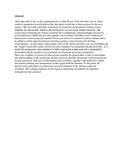Contribution of Africa’s Coastal and Marine Sectors to Sustainable Development
Abstract
More than half of the world's population lives within 60 km of the shoreline, and in Africa
trends in population growth indicate that this figure could rise to three quarters by the next
century. The lives and reasonable aspirations for economic advancement of these coastal
residents are inextricably linked to the productivity of coastal and marine resources. The
coastal areas bordering the African continent have traditionally supported highly productive
ecosystems from which fish and other aquatic resources have been harvested. Furthermore
these natural systems provide valuable services in terms of recreation, tourism, transportation
in addition to their natural protective functions against coastal erosion and flooding. Unfortunately,
in many parts of the region, most of the natural resources are over-exploited and the
fragile coastal and marine systems severely degraded by unregulated human activities. As a
result, the productivity and usefulness of these coastal and marine areas have dramatically
diminished and the prospects for sustainable development are greatly jeopardised.
There are a number of reasons for this serious situation. In general there is lack of knowledge
and understanding of the coastal and marine resources and their interaction with terrestrial and
oceanic processes. This lack of information and awareness, together with ineffective coastal
and marine planning and management further aggravated the situation. In this paper, the
present status and trends of coastal and ocean development in the African region are
examined. The existing capacities in the region to implement sustainable development
strategies are also assessed.
Citation
Odada, E. (2001). Contribution of Africa’s Coastal and Marine Sectors to Sustainable Development. ACP–EU Fisheries Research Report Number 10, 206.Publisher
University of Nairobi

